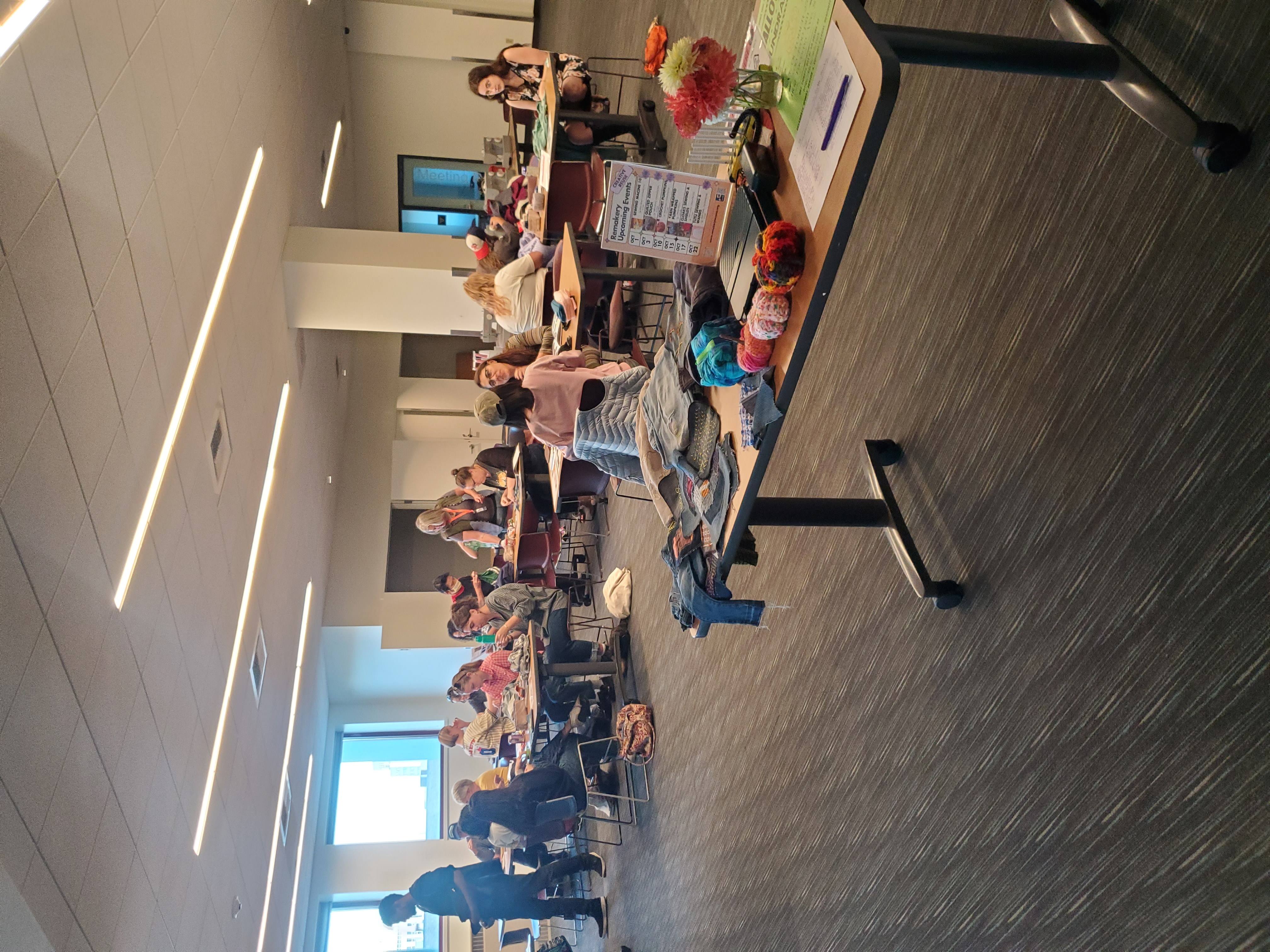
With my favorite pair of tattered Levi’s jeans in hand, I walk into the Tacoma Public Library to attend the free Visible Mending workshop hosted by the Remakery, a local nonprofit organization that helps people use donated materials to make inventive crafts and practical fixes on already-owned items. Some might describe my raggedy jeans as worthless, but I see them as well-loved. Holes cover nearly every surface of my pants, and they really need patching up.
The volunteers who greet me dedicate their time to teaching community members how to add thoughtful designs or fixes to their belongings. Elementary school-like tables line the room and soon fill up with around 20 attendees of all ages. In front of me, a young girl reads a book in the corner, and next to her, an elderly woman restores her green athletic shorts.
“Is this seat taken?”
I’m joined by Jessie Christian, a recent college graduate who started attending Remakery events in hopes of meeting new friends. She pulls out her flannel shirt to reattach its missing button, and we begin talking about the organization. She says that there are benefits to communal and public spaces of self-expression, such as increasing our “sense of community, knowledge-sharing, connecting older and younger generations, and teaching practical skills to people.”
My eyes meet those of the elderly woman repairing her shorts. She strikes up a conversation with two younger adults, and I hear her say, “We’re all learning here, aren’t we?” The Remakery is a rare space that connects generations in the name of creativity.
There is an unexpected joy in seeing all generations congregate at the Remakery. “There’s a lot of intergenerational separation these days,” Leigh Urbaniak, founder and director of the Remakery, said. “There’ll be programs for kids or there’ll be programs for retired folk.” Urbaniak points out how there are not many opportunities for different generations to work together.
Urbaniak felt inspired to create a space that fosters community for all while also minimizing the waste headed to landfills after witnessing the amount of unusable material brought into places like Goodwill thrift stores. By hosting events dedicated to upcycling used materials, the Remakery promotes a circular economy — instead of buying something, using it for a limited amount of time, and then throwing it away, the Remakery suggests that there is beauty in repairing your items and giving them a second chance at life.
I watch as volunteers mosey around and extend expertise to other attendees, helping them complete projects and learn which stitch is the best fit for their fabric type. I overhear birthday party plans and results from past sewing competitions from the ladies who circle our table, offering to help with our mending process. Christian says, they’re “teaching practical skills to people who might not know how to get them on their own.” Not only am I producing less waste, but I am also connecting with community members — people I likely wouldn’t have crossed paths with if not for the Remakery.
The placement of the Remakery is strategically designed to encourage this exact community connectedness. The Tacoma Public Library resides in the heart of downtown, with a public transit bus stop only a block away. The library’s central location provides ample opportunities for community members to take part in events. “Access. One of our big things is access,” Urbaniak said.
Much like the Remakery, the University is keen on encouraging communal crafting. Nestled in the basement of Collins Library on the University of Puget Sound’s campus is the Makerspace, a small room stuffed full of donated crafting materials for students and faculty to create with. I walk in on a Tuesday afternoon, and Andi Gonzales (‘26) is overseeing the area. Now a senior at the University, Gonzales was first drawn to the job four years ago when pursuing a work-study position. Asked what they enjoy about the job, Gonzales said, “You meet so many different types of people who have different interests, and they come in here and they bring it to life.”
Gonzales and I have the space to ourselves, and as the 3D printer whirrs in the background, I ask them what it means for the Tacoma community to have access to creative and communal places such as the Makerspace or the Remakery.
“Saying, ‘I want to create this thing, but I don’t know how,’ is putting yourself out there and being vulnerable,” they said. “I think that’s so hard for people to do, and so being able to do that in this communal craft space, I think, is very powerful for some people.” Creativity can be challenging for some, especially with so much crafting content online that promotes perfection without mistakes. Making an effort to nurture places that are free of judgment, especially when you ask attendees to be creative, is clearly impactful. Gonzales adds that as an employee, they understand the importance of “encouraging people and not necessarily letting them sit in their fear of ‘I can’t.’”
Spots like the Remakery and the Makerspace allow community members an opportunity for creating, but there are other advantages, too. These communal spaces are actively contributing to environmental sustainability by emphasizing the use of preexisting materials. “There’s a lot of economic benefits from not having to buy new stuff all the time, there’s a lot of health benefits from crafting,” Urbaniak said. To her, communal craft spaces are the gateway into a more expressive, empathetic, and eco-friendly world.
